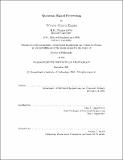| dc.contributor.advisor | Alan V. Oppenheim. | en_US |
| dc.contributor.author | Eldar, Yonina Chana, 1973- | en_US |
| dc.contributor.other | Massachusetts Institute of Technology. Dept. of Electrical Engineering and Computer Science. | en_US |
| dc.date.accessioned | 2005-05-19T14:39:29Z | |
| dc.date.available | 2005-05-19T14:39:29Z | |
| dc.date.copyright | 2001 | en_US |
| dc.date.issued | 2002 | en_US |
| dc.identifier.uri | http://hdl.handle.net/1721.1/16805 | |
| dc.description | Thesis (Ph. D.)--Massachusetts Institute of Technology, Dept. of Electrical Engineering and Computer Science, February 2002. | en_US |
| dc.description | Includes bibliographical references (p. 337-346). | en_US |
| dc.description | This electronic version was submitted by the student author. The certified thesis is available in the Institute Archives and Special Collections. | en_US |
| dc.description.abstract | Quantum signal processing (QSP) as formulated in this thesis, borrows from the formalism and principles of quantum mechanics and some of its interesting axioms and constraints, leading to a novel paradigm for signal processing with applications in areas ranging from frame theory, quantization and sampling methods to detection, parameter estimation, covariance shaping and multiuser wireless communication systems. The QSP framework is aimed at developing new or modifying existing signal processing algorithms by drawing a parallel between quantum mechanical measurements and signal processing algorithms, and by exploiting the rich mathematical structure of quantum mechanics, but not requiring a physical implementation based on quantum mechanics. This framework provides a unifying conceptual structure for a variety of traditional processing techniques, and a precise mathematical setting for developing generalizations and extensions of algorithms. Emulating the probabilistic nature of quantum mechanics in the QSP framework gives rise to probabilistic and randomized algorithms. As an example we introduce a probabilistic quantizer and derive its statistical properties. Exploiting the concept of generalized quantum measurements we develop frame-theoretical analogues of various quantum-mechanical concepts and results, as well as new classes of frames including oblique frame expansions, that are then applied to the development of a general framework for sampling in arbitrary spaces. Building upon the problem of optimal quantum measurement design, we develop and discuss applications of optimal methods that construct a set of vectors. | en_US |
| dc.description.abstract | (cont.) We demonstrate that, even for problems without inherent inner product constraints, imposing such constraints in combination with least-squares inner product shaping leads to interesting processing techniques that often exhibit improved performance over traditional methods. In particular, we formulate a new viewpoint toward matched filter detection that leads to the notion of minimum mean-squared error covariance shaping. Using this concept we develop an effective linear estimator for the unknown parameters in a linear model, referred to as the covariance shaping least-squares estimator. Applying this estimator to a multiuser wireless setting, we derive an efficient covariance shaping multiuser receiver for suppressing interference in multiuser communication systems. | en_US |
| dc.description.statementofresponsibility | by Yonina Chana Eldar. | en_US |
| dc.format.extent | 346 p. | en_US |
| dc.format.extent | 3228057 bytes | |
| dc.format.extent | 3227811 bytes | |
| dc.format.mimetype | application/pdf | |
| dc.format.mimetype | application/pdf | |
| dc.language.iso | eng | en_US |
| dc.publisher | Massachusetts Institute of Technology | en_US |
| dc.rights | M.I.T. theses are protected by copyright. They may be viewed from this source for any purpose, but reproduction or distribution in any format is prohibited without written permission. See provided URL for inquiries about permission. | en_US |
| dc.rights.uri | http://dspace.mit.edu/handle/1721.1/7582 | |
| dc.subject | Electrical Engineering and Computer Science. | en_US |
| dc.title | Quantum signal processing | en_US |
| dc.type | Thesis | en_US |
| dc.description.degree | Ph.D. | en_US |
| dc.contributor.department | Massachusetts Institute of Technology. Department of Electrical Engineering and Computer Science | |
| dc.identifier.oclc | 50544999 | en_US |
